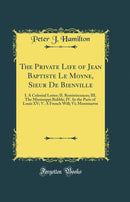Description
One warm October day in 1718 a man sat on his front gallerie at Mobile writing a letter. The house was one-story made of uprights filled in with mor tar, but the palings enclosed a whole city block. Facing Royal street. The ground was high and af forded views in all'' directions to the watchful eves of the writer, a pleasant looking, clean shaven man of thirty-three years. He had on a new coat and shirt, but the rest of his clothing was old, although still distinguishable as the uniform of a French of ficer. Near by was his grinning negro Bon Temps, and Indian slaves moved quietly about the place. While from a room within came confused sounds and occasional laughter of officers engaged in a game of vignt-et-un. Every now and then the writer would pause and look out upon the boats in the river, or over the esplanade to his left at a large fort of pal isades. As he mended his pen, his mind would go back to a childhood that could hardly remember father or mother, spent in Montreal or on the Oana dian estate inherited by the older brother. To whom he was writing, and who had well played the part of father.
For this was Jean Baptiste lemoyne de Bienville, writing the one private letter which has come down to us. He derived his title on the death of an older brother, who was called for Bienville, near Dieppein Normandy, whence their father came. From 1690 he had been in the king''s service, and in that, year his widowed mother died when he was only ten years old. He took part, one way or another, in expedi tions against the Indians and forays towards New England, and a few years later he was garde marin, or midshipman, at Brest and Rochefort, the two great ports of France facing the Atlantic.
About the Publisher
Forgotten Books publishes hundreds of thousands of rare and classic books. Find more at www.forgottenbooks.com
This book is a reproduction of an important historical work. Forgotten Books uses state-of-the-art technology to digitally reconstruct the work, preserving the original format whilst repairing imperfections present in the aged copy. In rare cases, an imperfection in the original, such as a blemish or missing page, may be replicated in our edition. We do, however, repair the vast majority of imperfections successfully; any imperfections that remain are intentionally left to preserve the state of such historical works.
Details
Publisher - Forgotten Books
Language - English
Hardback
Contributors
Author
Peter J. Hamilton
Published Date -
ISBN - 9780266720607
Dimensions - 22.9 x 15.2 x 0.1 cm
Page Count - 18
Paperback
Contributors
Author
Peter J. Hamilton
Published Date -
ISBN - 9781332181667
Dimensions - 22.9 x 15.2 x 0.1 cm
Page Count - 20
Payment & Security
Your payment information is processed securely. We do not store credit card details nor have access to your credit card information.


